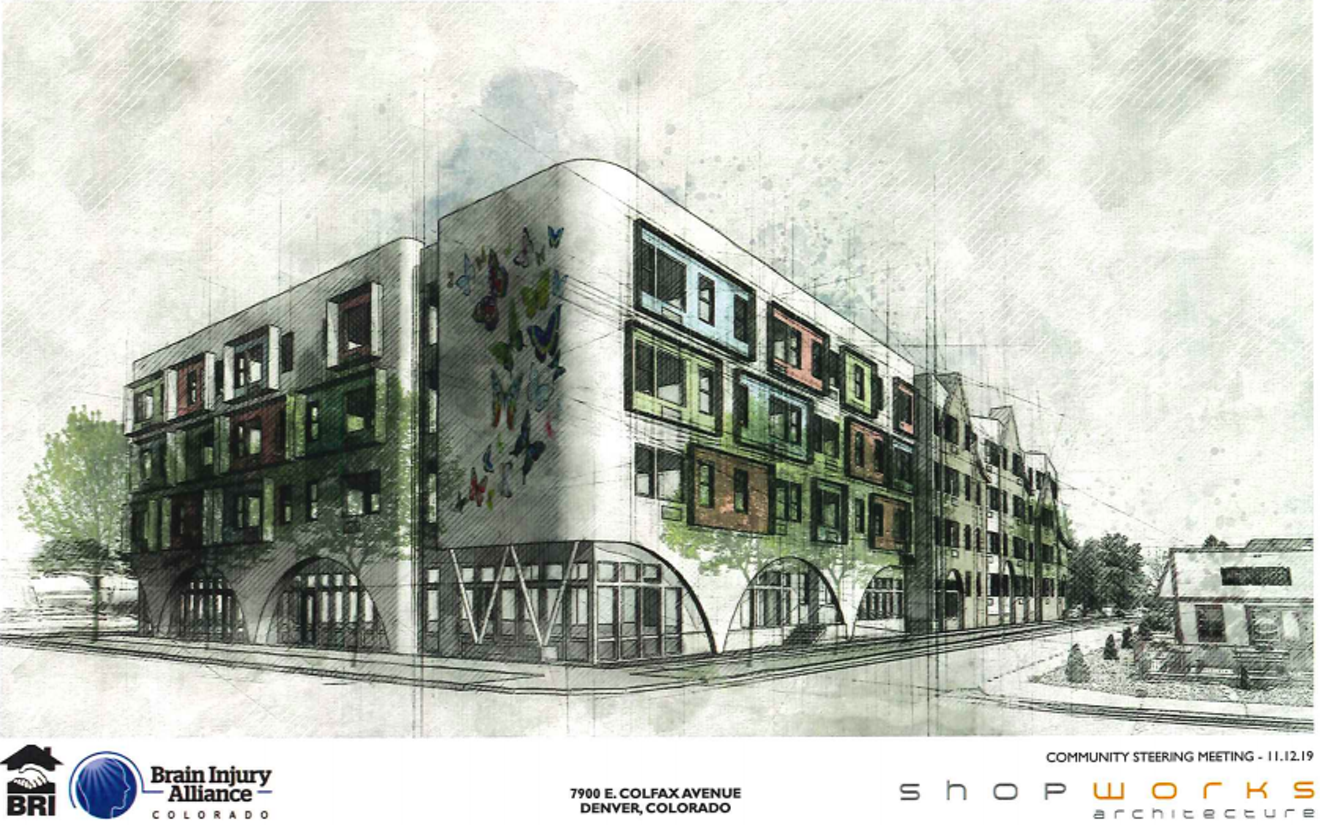Brothers Redevelopment is moving forward with plans to purchase an empty lot at 7900 East Colfax Avenue — a former bar across from a strip club with the infamous "Nude Dancing" sign — from the city. The nonprofit builder will create a first-of-its-kind affordable-housing complex for people with brain injuries.
For the city, it's an example of land-acquisition strategy it hopes to ramp up in the coming years to promote the construction of affordable housing at the lowest income levels. For Brothers Redevelopment, it's a chance to implement an innovative model to provide permanent supportive housing for a vulnerable population.
The city bought the lot back in 2017 for $650,000, intending to use it for affordable housing because of its proximity to public transit and location in a marginalized area. The Housing Division of the Department of Economic Development and Opportunity (which has now been folded into the new Department of Housing Stability) selected Brothers Redevelopment through a competitive RFP process in June. Denver City Council’s committee on finance and governance reviewed the proposal to purchase the property on December 10, passing it on to the full council.
The city's investments in affordable housing have historically focused on the higher end of the income spectrum in need. This complex will provide 72 units of housing for individuals and families below 30 percent of the Area Median Income — for a single person, that’s an annual income under $19,500.
Jeff Martinez, president of Brothers Redevelopment, says there isn't another permanent supportive housing project specifically for people with brain injuries in the U.S. Brothers Redevelopment, a longstanding nonprofit that currently manages fourteen affordable-housing communities throughout the metro area, had been wanting to try permanent supportive housing for a while, a model in which a complex is staffed with direct service providers who help fulfill the needs of a specific population.
At the same time, the Brain Injury Alliance of Colorado had been wanting a partner to provide housing to some of its clients who had suffered traumatic brain injuries. That population overlaps heavily with the homeless. In the Denver area, over 13 percent of individuals experiencing homelessness who are tracked in the OneHome coordinated entry system reported that a head injury has impacted their ability to find and maintain stable housing.
One study published earlier this month that examined six wealthy nations found that over half of homeless men had suffered a traumatic brain injury at some point in their life. The riskiness of life on the streets also predisposes one to a higher likelihood of sustaining a traumatic brain injury. For those with a TBI, behavioral impairments and short-term memory loss may make it harder to hold down a job, pay rent on time or abide by the terms of a lease. So having built-in support is crucial to finding housing stability.
When the city put out an RFP for the property, the two organizations saw the perfect opportunity to team up. After being awarded a contract with the city, Brothers Redevelopment is requesting council approval to purchase the land for $10 and a lot of fine print: It will have to maintain the building as affordable for the next 99 years, and the city will have the right of first refusal to buy the property on any future sale. Next year, Brothers Redevelopment will apply for low-income housing tax credits to finance the construction.
Loose plans outline a four-story building with design features that blend in with the mid-century neon style of Highway 40, incorporating suggestions from a steering committee of East Colfax residents. It isn't projected to be completed until 2022, but Brothers will soon open applications to anyone below 30 percent AMI who can self-certify that they have a brain injury.
Martinez says the city's investment in the Colfax lot has enabled it to do something it probably wouldn't otherwise be able to. "We want to do what we can to address the need for affordable housing. It’s just very expensive, and we don’t have the deep pockets that other for-profit developers have to buy market rate land," he says.
[
{
"name": "Air - MediumRectangle - Inline Content - Mobile Display Size",
"component": "12017618",
"insertPoint": "2",
"requiredCountToDisplay": "2"
},{
"name": "Editor Picks",
"component": "17242653",
"insertPoint": "4",
"requiredCountToDisplay": "1"
},{
"name": "Inline Links",
"component": "18838239",
"insertPoint": "8th",
"startingPoint": 8,
"requiredCountToDisplay": "7",
"maxInsertions": 25
},{
"name": "Air - MediumRectangle - Combo - Inline Content",
"component": "17261320",
"insertPoint": "8th",
"startingPoint": 8,
"requiredCountToDisplay": "7",
"maxInsertions": 25
},{
"name": "Inline Links",
"component": "18838239",
"insertPoint": "8th",
"startingPoint": 12,
"requiredCountToDisplay": "11",
"maxInsertions": 25
},{
"name": "Air - Leaderboard Tower - Combo - Inline Content",
"component": "17261321",
"insertPoint": "8th",
"startingPoint": 12,
"requiredCountToDisplay": "11",
"maxInsertions": 25
}
]












